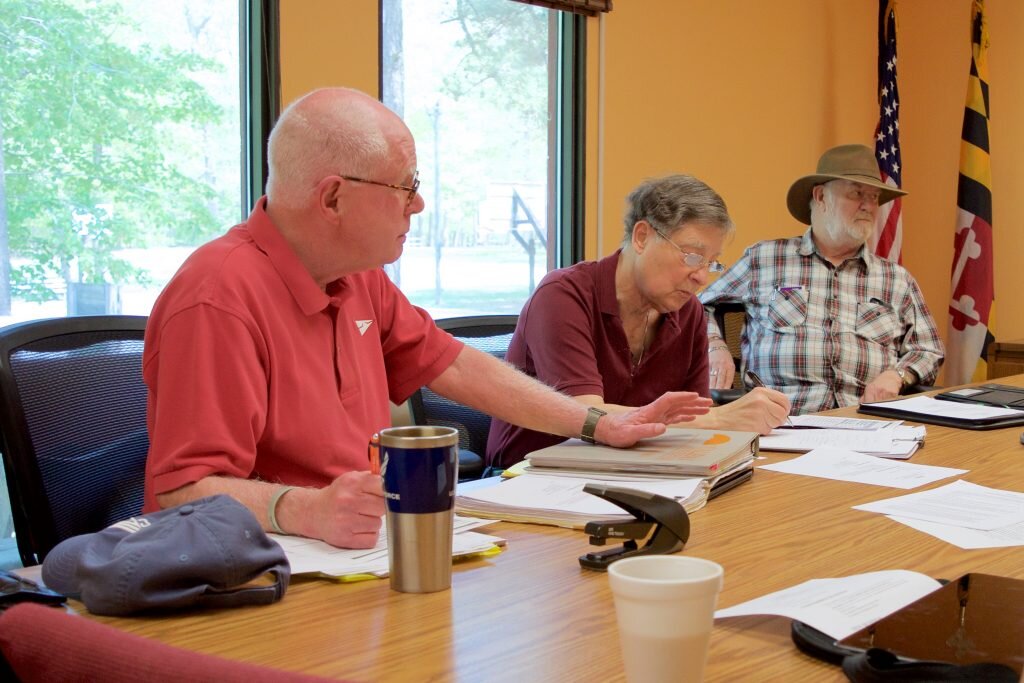
Bylaws and Resolutions Committee Chairman Marty Clarke, right, during a meeting last Friday gives his take on whether the Ocean Pines Board is following its bylaws when it comes to agenda meetings.
By Josh Davis, Associate Editor
(May 10, 2018) Just how much information should be included in public meeting agendas became a subject of debate during an Ocean Pines Bylaws and Resolutions Committee meeting last Friday.
Director Slobodan Trendic, speaking during the public comments portion of the meeting, said the board had been challenged about, “whether we publish the agenda correctly and whether we provide supporting information.”
Resolution B-04, on agenda development, requires submission of discussion topics to include background and “a concise statement of the issue(s) to be discussed.”
“According to certain individuals, that doesn’t seem to be what the board is doing,” Trendic said.
Director Ted Moroney, the committee liaison, said published agendas include background and justifications for motions, but “the [discussion] topics do not.”
“The question, I think, is, do you have to include background and relative discussion on topics as part of the publication?” Moroney said.
Bylaws Committee Chairman Marty Clarke said, for one, why not? Also, Clarke said Ocean Pines regulations state, essentially, “if you’ve got it, we get it.”
“The resolution doesn’t require it. It requires us to submit it to the directors and to the secretary, so they’re aware of what we want to talk about and why,” Trendic said. “The resolution does not require that background be part of the actual agenda that’s being published, however it requires that I tell the directors what I want to talk about.”
Clarke said he would add review of the resolution to the committee’s workload, but added, “it’s up to the board to make that decision – not us.”
“I always lean toward disclosure. When in doubt, disclose,” Clarke said.
Committee member Jeff Knepper added, while the resolution does explicitly require more detailed information on published agendas, it also does not prohibit it.
“Relatively few people are good at contact learning of complex issues. Most people do better if they have something to read about what it’s about, what are you trying to do, why is it important,” he said. “Motions are so important that we call it out to be in there and the question here is, does that same kind of reasoning apply to a discussion where, by definition, there is no action being taken.
“If we want to talk it intelligently, shouldn’t we … have the opportunity to read it [and] know it is?” he added.
Resident Joe Reynolds agreed.
“I don’t know why any board member would say, ‘I don’t want the association members to know all the information about what I’m going to propose’ – that baffles me,” he said. “The very purpose of this resolution is to make sure that association members are informed about what this board of directors intends to do with their money and their association.
“I don’t see any problem at all with the language in this – except for what Slobodan Trendic has decided is a problem – because these things have been published in the past,” he continued. “All the sudden at this last meeting they were not published, and I don’t know why.”
Clarke, several times, tried to intervene and get the meeting back on track as Trendic and Reynolds verbally sparred.
“If you guys want to go to the bar and arm wrestle, be my guest. We all know what we have to know,” he said. “Nothing is going to change in the next month, until we meet again.”
Committee member Jim Trummel added a note of caution, explaining Resolution B-04 was designated in governing documents to be “specifically assigned to the board of directors.”
“Whatever comes out of this has to come out of the directors,” he said. “Our responsibility in this kind of a situation is to ensure that we don’t have any inconsistencies within our documentation,” he said.
Trummel said language in the bylaws required only that meeting notice include “the date, time, place and purpose(s) of the meeting.”
“The word ‘agenda’ is not even used,” he said. “When it comes to our participation in this effort, as far as looking at consistency within association documents, guys, it’s wide open. You can virtually do whatever you want to do.”
Trendic said the directors would take that into consideration.
Reynolds asked both Trendic and Moroney whether they believed more information on discussion topics should be included in meeting agendas. Both said they did.
“Well, let’s provide it,” Reynolds said.
“Nobody in this room is arguing except for you and Slobodan,” Moroney said. “Go out in the backyard and fight it out – we’re all on the same page!”
